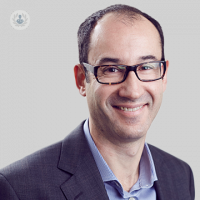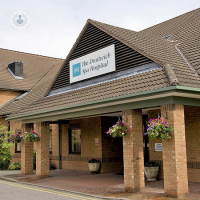What is revision hip replacement?
Hip replacement surgery is a very successful procedure and many patients undergoing a total hip replacement do not experience any problems. Over time, however, it may become necessary for hip replacements to be revised and for further surgery to be performed.

Why is it done?
Most hip revision surgeries are done because the hip has become loose, due to the ball wearing the socket down. This leads to inflammation and the loosening of the socket.
Other reasons that a hip replacement needs to be carried out are:
- The hip has become dislocated due to an infection
- A fracture has caused the hip replacement to require a revision
What does it involve?
Revision hip surgery is a major surgery that can take 3 or more hours. It involves the removal of the old hip and replacing it or restoring the damaged bone. Before the operation, your surgeon will answer any questions that you have and then you will meet with the anaesthetist. There are slightly increased risks of infection or dislocation following the revision surgery, in comparison with the primary hip replacement surgery. Most patients will be catheterised, and the catheter will be removed 2 to 3 days after the operation.
How do I prepare for it?
One to two weeks before the surgery, you will be brought into the hospital for an assessment. Routine tests, such as blood tests, urine tests and MRSA screening will be carried out at the hospital.
Post-operative care
Most patients go home five to six days after the surgery. After the operation, your surgeon and physiotherapist will decide how quickly you can bear weight on the hip. Your physiotherapist will teach you how to safely get in and out of bed, the bathtub and car. When you can safely walk and your wounds are clean and have healed, you will be discharged.
You will be asked to wear compression stockings for the next six weeks to reduce the risk of developing a blood clot. It will be advisable to sleep on your back and to avoid bending at the hip, twisting your waist and crossing your legs.
It generally takes about 6 weeks for patients to walk with one stick and most patients return to work after about eight weeks, depending on how much revision surgery they required.
06-10-2017Revisión de reemplazo de cadera
What is revision hip replacement?
Hip replacement surgery is a very successful procedure and many patients undergoing a total hip replacement do not experience any problems. Over time, however, it may become necessary for hip replacements to be revised and for further surgery to be performed.

Why is it done?
Most hip revision surgeries are done because the hip has become loose, due to the ball wearing the socket down. This leads to inflammation and the loosening of the socket.
Other reasons that a hip replacement needs to be carried out are:
- The hip has become dislocated due to an infection
- A fracture has caused the hip replacement to require a revision
What does it involve?
Revision hip surgery is a major surgery that can take 3 or more hours. It involves the removal of the old hip and replacing it or restoring the damaged bone. Before the operation, your surgeon will answer any questions that you have and then you will meet with the anaesthetist. There are slightly increased risks of infection or dislocation following the revision surgery, in comparison with the primary hip replacement surgery. Most patients will be catheterised, and the catheter will be removed 2 to 3 days after the operation.
How do I prepare for it?
One to two weeks before the surgery, you will be brought into the hospital for an assessment. Routine tests, such as blood tests, urine tests and MRSA screening will be carried out at the hospital.
Post-operative care
Most patients go home five to six days after the surgery. After the operation, your surgeon and physiotherapist will decide how quickly you can bear weight on the hip. Your physiotherapist will teach you how to safely get in and out of bed, the bathtub and car. When you can safely walk and your wounds are clean and have healed, you will be discharged.
You will be asked to wear compression stockings for the next six weeks to reduce the risk of developing a blood clot. It will be advisable to sleep on your back and to avoid bending at the hip, twisting your waist and crossing your legs.
It generally takes about 6 weeks for patients to walk with one stick and most patients return to work after about eight weeks, depending on how much revision surgery they required.
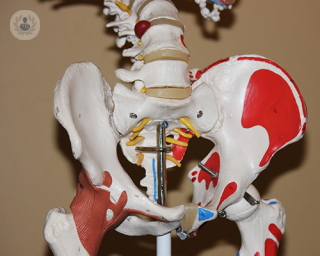

How to know if your hip replacement is becoming loose (and what to do about it)
Por Mr Adam Cohen
2025-02-08
Ver más


Understanding your hip replacement: A guide to the different options
Por Mr Andrew Skyrme
2025-02-08
Patients with hip arthritis who have been recommended for hip replacement surgery may be overwhelmed by the variety of options available and the surgery and recovery period to come. In this detailed guide, leading consultant orthopaedic surgeon Mr Andrew Skyrme sheds light on which patients may be most suitable for the various types of hip replacement and explains the steps he takes in his own practice to ensure the best outcomes for his patients. Ver más
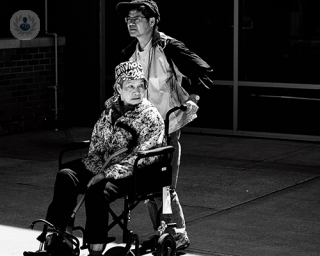

Revision hip replacement: why do hip replacements fail?
Por Mr Nick de Roeck
2025-02-08
Hip replacement is generally a very successful procedure in relieving the pain and stiffness associated with a damaged hip joint. However, hip replacements can fail and there are several reasons why this can happen. Expert orthopaedic surgeon Mr Nick de Roeck explains why. Ver más
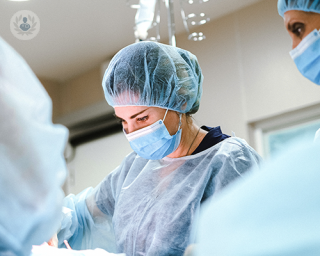

How to know if your hip replacement needs revising and what to expect from revision surgery
Por Mr Amol Chitre
2025-02-07
Mr Amol Chitre explains how you can identify the need for revision hip surgery and what to expect from it. Ver más
Doctores expertos en Revisión de reemplazo de cadera
-
Mr James Donaldson
TraumatologíaExperto en:
- Recambios de cadera
- Prótesis de rodilla
- Cirugía robótica
- Revisión de reemplazo de cadera
- Revisión reemplazo de rodilla
- Artroscopia de rodilla
-
Mr Constant Busch
TraumatologíaExperto en:
- Recambios de cadera
- Prótesis de rodilla
- Dolor de cadera
- Artroscopia de rodilla
- Infiltraciones articulares
- Revisión de reemplazo de cadera
-
Mr Seb Sturridge
TraumatologíaExperto en:
- Artroscopia de cadera
- Recambios de cadera
- Revisión de reemplazo de cadera
- Pinzamiento femoro-acetabular
- Artroscopia de rodilla
- Prótesis de rodilla
-
Professor Paul Lee
TraumatologíaExperto en:
- Recambios de cadera
- Rodilla
- Trasplante de cartílago
- Revisión de reemplazo de cadera
- Meniscos
- Ligamento cruzado anterior
-
Mr Duncan Whitwell
TraumatologíaExperto en:
- Tumores óseos
- Sarcoma
- Revisión de reemplazo de cadera
- Revisión reemplazo de rodilla
- Prótesis de rodilla
- Recambios de cadera
- Ver todos

The Droitwich Spa Hospital - part of Circle Health Group
The Droitwich Spa Hospital - part of Circle Health Group
St Andrews Rd, Droitwich WR9 8DN
No existe teléfono en el centro.
Si haces uso de este teléfono facilitado por TOP DOCTORS nos autorizas al tratamiento de tu teléfono para fines estadísticos y comerciales. Para más información, lee nuestra Política de Privacidad
Top Doctors

Platinum Medical Centre (HCA)
Platinum Medical Centre (HCA)
15-17 Lodge Road, NW8 7JA
No existe teléfono en el centro.
Si haces uso de este teléfono facilitado por TOP DOCTORS nos autorizas al tratamiento de tu teléfono para fines estadísticos y comerciales. Para más información, lee nuestra Política de Privacidad
Top Doctors

Elstree Waterfront Outpatients Centre (HCA)
Elstree Waterfront Outpatients Centre (HCA)
Elstree Road, WD6 3BS
No existe teléfono en el centro.
Si haces uso de este teléfono facilitado por TOP DOCTORS nos autorizas al tratamiento de tu teléfono para fines estadísticos y comerciales. Para más información, lee nuestra Política de Privacidad
Top Doctors
-
The Droitwich Spa Hospital - part of Circle Health Group
St Andrews Rd, Droitwich WR9 8DN, Droitwich SpaExperto en:
- Abdominal ultrasound
- Abdominoplastia
- Angiología y Cirugía vascular
- Artritis
- Blefaroplastia
- Cadera
-
Platinum Medical Centre (HCA)
15-17 Lodge Road, NW8 7JA, Central LondonExperto en:
- Aparato Digestivo
- Cáncer
- Cirugía ortopédica
- Diagnóstico por imagen
- Espina
- Fisioterapia
-
Elstree Waterfront Outpatients Centre (HCA)
Elstree Road, WD6 3BS, ElstreeExperto en:
- Análisis de sangre
- Cardiología
- Dermatología
- Diagnóstico por imagen
- Neurología
- Pediatría


